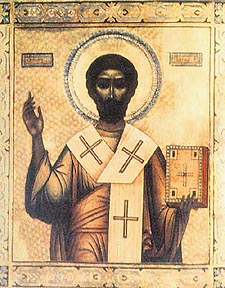|
|||
|---|---|---|---|
| This weekly bulletin insert complements the curriculum published by the Department of Christian Education of the Orthodox Church in America. This and many other Christian Education resources are available at http://dce.oca.org. | |||

One of the Holy Apostles is Barnabas, the companion of St. Paul. Barnabas was born in Cyprus into a Jewish family of the tribe of Levi. His birth name was Joseph. He was a friend and classmate of Saint Paul, then called Saul, and they both studied under Gamaliel, the prominent rabbi and teacher of the Jewish Law. Joseph saw and heard Jesus Christ, and came to believe in Him as the Savior of the world. He would eventually be chosen as one of the original seventy apostles because of his great zeal for the Gospel. We first read about Barnabas in Acts 4: 36. Those verses describe the sacrifice the early Christians made, selling their property and offering the proceeds to serve the needs of all. But only Joseph "who was surnamed by the apostles Barnabas" is specifically named, so he must have stood out. The name Barnabas means "son of encouragement" and it seems appropriate from the other things we know about him. In Acts 9 we read about Saint Paul, now converted from a murderous enemy of the faith to a believer. He comes to Jerusalem, hoping to join the disciples. But "they were all afraid of him, for they did not believe that he was a disciple." Again, Barnabas is named specifically, and is apparently the only one willing to give Paul a second chance. He convinces the others by telling them that "at Damascus he (Paul) had preached boldly in the name of the Lord" (9: 27). Barnabas went to Antioch to observe the preaching to non-Jews in the community there. He was glad to see the grace of God working, and urged the people to "remain faithful to the Lord with steadfast purpose" (11: 23). Then he brought Paul from Tarsus to Antioch, where they taught a "large company" together for about a year. This is where we read that "in Antioch the disciples were for the first time called Christians."
Paul and Barnabas continued their missionary work, accompanied by Barnabas' relative John Mark. But when they got to Perga, John Mark left them to return to Jerusalem. Later, Paul suggested to Barnabas that they return to the cities where they had preached, to "see how they are" (15: 36). Barnabas, again giving someone a second chance, proposed that they take John Mark with them. But Paul refused because of the earlier desertion, and he and Barnabas parted ways. They were later reconciled, and it's likely that Barnabas' kind nature was the key to healing the split and giving their friendship a second chance. In Romans 5: 10 we read Paul's words about reconciliation: "For if while we were enemies we were reconciled to God by the death of His Son, much more, now that we are reconciled, shall we be saved by His life." Paul must have been glad to have a partner like Barnabas who urged him toward reconciliation and second chances. |
|||
